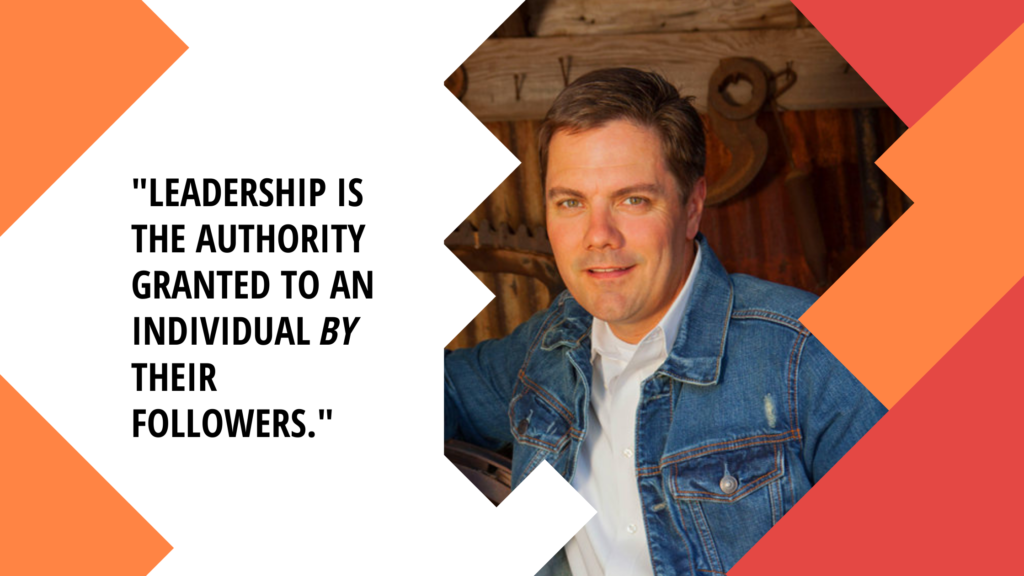Learn to Lead Podcast: How to Manage Yourself (and Why You Should)
Croft Edwards is a Master Certified Coach who has served an array of clients with his company Croft + Company. He has created Performance Management Process courses and accompanying one-on-one coaching sessions with over 90 leaders of the largest platinum and palladium mining company in the western hemisphere. In this interview, we discuss why the first person you must learn to manage is yourself, how he arrived at the concept of the “leadership flow”, his book writing process, and what he disagrees with about mainstream leadership development.

I’m going to kick us off with a quote from the homepage of your website and it is this, “The most difficult person you will ever lead is yourself.” Can you give our listeners a sense of how that quote drives you and drives the work that you do?
I would love to say that I just brilliantly thought about it, but that really just kind of came about in conversations in organizations, and I would find myself saying it.
When we really started looking at the leadership flow methodology, it actually came up as the centerpiece because I’ve always felt like leading ourselves is actually more difficult than leading other people. If I can get myself out of the way, leading other people is actually somewhat a little bit of an easier task than getting me in the way. I’ve got to get “me” out of the way to be an effective leader.
One thing that I’ve really enjoyed about these opportunities is the chance to ask people how they got so interested in what they were doing. Is there a moment from your career in the armed services that helped drive the place that you are today and the work that you do?
Actually, it’s even earlier than that. As a kid, when I was about eight years old, I read Omar Bradley’s autobiography. I didn’t realize it at the time, but it piqued in me a fundamental question, which I’ve been exploring ever since, which was, why was he or any leader, for that matter, successful? What is this thing called leadership?
More importantly, I think what I’ve always been interested in is the actual “how do you do it?” There’s a lot of books out there that leaders are – they’re full of integrity. That’s great, but how do you actually do that? That’s really the moment that I planted the seed, and I’ve been pursuing it ever since.
One thing that came out from your website that I thought was really interesting is it talks about leadership in terms of rafting down a river, and it says, “Leaders encounter different classes of rapids from the less challenging to the near-impossible.” How does that visual help guide your approach as a leader and the work that you do to help other leaders?
Whether I’m just in the boat for the first time, or I’ve been doing it for years, a key piece to leadership is practice, and that which we practice we become good at.
A lot of what I look at, if I look at successful leaders, whether they’re aware of it or not, they’ve been practicing behaviors that have been effective. What we really look at is, “What are your practices, and are they creating the leaders you want to create?” If not, then we have to create new practices.
“If you’re asking me to teach people to hold them accountable or hold others accountable, you’re actually doing exactly what you say you want to be changed. You’re not holding your team accountable.”
Croft Edwards
What surprises you the most when you get into an organization? When you’re asking those initial questions, what are you trying to suss out about those initial things about how they develop leaders or how their current leaders operate?
I always go in with this idea that the conversation I have with the senior leaders is going to tell me what’s possible in the organization because leadership is one of those things. I’ve been brought into organizations and they say, “Hey, our supervisors, they don’t hold people accountable.” My immediate question is or my thought is, “Guess where they learned it?”
Because if you’re asking me to teach people to hold them accountable or hold others accountable, you’re actually doing exactly what you say you want to be changed. You’re not holding your team accountable. It’s not your subordinate leaders that need to learn how to hold people accountable, it’s actually you need to learn how to hold people accountable.
I almost always end up at the senior leaders’ desk because what they do determines what conversations happen effectively or ineffectively or are missing in the organization.
You’ve been in this field and around certain industries for enough time that you’ve probably seen some changes happen. What surprised you the most about the field of leadership in your time really focused on it and focused on helping people develop their skills so they can be more effective in this pursuit?
We’ve bought this idea that everybody’s got to have a voice. Now, that may be hearsay to some people for me to say this, but now, not actually everybody gets a voice. Because leadership is sometimes having conversations that people don’t want to hear. I think one of the challenges that a lot of leaders face is they think that everybody has to have a say and everything has to be perfect.
No, actually, it’s having the conversations with people to teach them that, you may not get a say, and that doesn’t mean you can’t find fulfillment in your work, but just because you want it to be a certain way, doesn’t mean that you’re going to get it to be that way.
We’ve had the pleasure of having authors on the show, many different authors on the show. I’m always interested in the process for bringing a book to life, what you’ve learned along the way, and in some ways, the origin story of what brought that to the forefront for you is something that you wanted to do. Can you talk a little bit about the book, how you brought it to life, and what you learned from that process?
Yes. I had one of my major clients, this was in the summer of 2016. Literally, I was there on a Friday and then found out on Monday that there was a corporate-wide edict from management that said no more consultants, and so, literally, half my year was just wiped off the calendar in a phone call. My wife said, “Maybe you should use this time to write a book,” and I thought, “Well, I don’t know.”
All of a sudden, I had the month of August open, and I thought, “You know what, I live on a farm.” Back to the idea of leadership flow, I get a lot of flow from just out working in my garden, working in the fields, whatever. I spent a week and I said, “Okay, if I was going to write a book, what would I write?”
At the end of the week, I realized, “You know what, maybe I’m just going to do this.” I started the following Monday morning, and I would write usually a chapter or two per morning, and then I go spend the afternoon out in the fields, or on the farm doing chores. I would actually write the next day’s chapters in my mind, and then I would get up the next morning and write it again. Actually, the book literally took about almost three weeks to write, but that was start to finish.
I’m very proud to say that 95% of what is in the book was the original story. It was just a little bit of editing. We tweaked this, and we tweaked that, but fundamentally, it flowed.
We’ve had a few guests that have the armed services as a pivotal part of their background and you would obviously fit into that category. What about your time in the armed services do you think most abruptly shapes the leader that you are today and how you’ve changed as a leader over time?
One of the definitions I use of leadership is the authority granted to an individual by the organization. So leadership is the authority granted to an individual by their followers. As I started off as a young lieutenant, I had management authority, but I had to earn the leadership authority.
The irony I found was, as I grew as a leader and I grew in rank, the rank became less and less relevant. Because I realized that, at this point, I need to have different conversations, and so if my only recourse is to fall back on my rank and tell people to do it, then I probably haven’t had an effective conversation. That was the biggest thing, as I got higher in rank, I realized I really didn’t need my rank, I just needed to have different conversations.
One question that I’ve enjoyed asking and getting people’s different perspective on is, is there a common belief around developing the leaders of tomorrow that you potentially fundamentally disagree with?
I think it goes back to that idea that everybody’s correct and everybody has a say. I think, as a leader, you’re always teaching people what it means to be a leader. It goes back to that definition of leadership where they say, “I want to do this because I’m committed”, or did they have to do it because they felt compliant?
I think leaders are always creating the situation, they’re creating the culture, they’re creating the possibilities with the conversations that they have.
What are you the most curious about right now? It can be something directly in this space, or it can be something outside of this space? What has your curiosity going in terms of what you want to work on next, or what you want to help people with next?
I think the place that I’m most curious right now is on being present, and not worrying about tomorrow not being somewhere else, but being in this moment right now.
That’s a place where I really spend a lot of time when I’m on a coaching call with somebody, can I be fully present to them, and to this moment so that this moment is getting all of me and then I’ll worry about the next conversation when I get to that next conversation. I really am curious about just being present.
That’s an interesting segue into one of the things that we hear from a lot of our listeners who ask about routine, or how people set up their day or organize themselves for success. Do you have anything that is something that really works for you, or maybe something that you’ve changed recently that has made a marked improvement in how you organize your day, or how you prepare yourself?
I’ve spent a lot of practice in the body of literally practicing how I want to show up to conversations. I have a pretty regimented routine to show up as present with my coachees. Now, what’s interesting, though, it doesn’t always mean I do it because there are days when I’m not on, and I feel like, “Oh gosh, my mind is wandering”. That’s when I really have to focus even more on being present. I do that a lot of times through exercises in the body of relaxing my body, how I sit, where my body is in relation to being vertical, forward, back, stuff like that.
When you look back at yourself and how you’ve evolved, is there a piece of advice that you’d give your younger self or more generically to individuals who are a little bit earlier in their career that you wish you maybe would have known when you started out?
When I was a lieutenant, or actually even back when I was a cadet, I couldn’t wait to be a lieutenant. Then I became a lieutenant and I couldn’t wait to be a captain. I became a captain and I couldn’t wait to be a major. I think if I went back and could do it again, I would focus on being the best lieutenant I could have been when I was a young lieutenant.
Be the leader that you are right now and be present with that and be the best at what you’re doing right now, as opposed to worrying about, “Well, I need a bigger role. I need a bigger title,” or whatever the case may be. Just be the best you are with this and then that will take care of itself.
Another thing that we’ve talked with a lot of our guests about is risk-taking. You hit on it a little bit with regard to the book, meaning you weren’t necessarily an accomplished author before you jumped down that path. How do you approach risk-taking? It seems like you’ve jumped headfirst into that pretty quickly. When you think about how that has shaped the person you are and the leader you are today, how do you approach risk-taking today?
I try to do a lot of self-awareness and be very present in my body in the moment. Then through practice, I’ve learned to trust my intuition.
I will make the assessment and I’ve learned this, for instance, a lot in coaching. If I’m coaching somebody, I listen to my internal voice, and 99.9% of the time, that voice serves me and so my practice is saying what I’m actually thinking.
I really work on as a coach, just saying, showing up, and trusting that that’s what the conversation needs or what the opening for the conversation is calling for. I find that that tends to be super relevant and more and more effective with the coachee.
That’s a wonderful spot to shift to our final two rapid-fire questions that I get to ask all of our guests. The first one is this, if you could describe your leadership style in just one word, what would that word be?
Versatility.
The final rapid-fire question is this, what is the best piece of advice that you have ever received?
I think the statement or the quote that I use more than any is by Abraham Lincoln, and it is, “The greatest gift a man can give his children is to love their mother.”
I really strive to be a husband and father first, and then the other things I assess will take care of themselves.
—
This interview has been edited for clarity.





